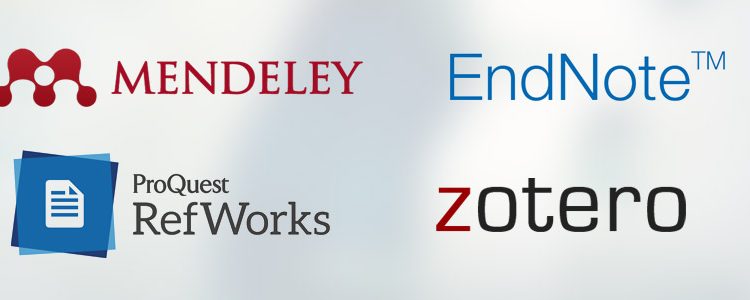Good Reference Management Tools for Manuscripts and Theses

All scientists know that to get published, they must have novel data. Therefore, when a researcher designs experiments and writes manuscripts, information and use of previous studies are fundamental. Indeed, a scientist must know what is known before designing an experiment. To help manage all of the research articles and studies that scientists sift through daily, there are citation managers that help organize papers. Among the various citation management tools such as Mendeley, Zotero, EndNote, and RefWorks, which citation tool is best suited for you?
Originally, reference managers helped researchers correctly format their citations. These tools have come a long way since then. However, with all the new options and features, deciding which citation tool works best requires background work and awareness. Among the various options available to the scientist, few common citation managers are RefWorks, Zotero, Mendeley, and EndNote.
EndNote: A tool for managing and publishing bibliographies, citations, and references.
Mendeley: A tool for reference management and for collaborating and sharing your work.
Zotero: A tool for managing and organize different resources and for sharing research.
RefWorks: A tool for managing and organizing bibliographies.
Features of the Top Citation Management Tools
The basic features of the citation management tools are often similar; however, they offer distinct services.
| EndNote | RefWorks | Zotero | Mendeley | |
| Costs | Free (basic)
Desktop ($116) |
Free
(Institution-Dependent) |
Free | Free (basic edition) |
| Access | Desktop software & web based version | Web-based | Plug-in for browser or stand-alone version for desktop available | Desktop Version |
| Shareable Data | Reference Library | Reference Library | Reference and PDF library are shareable | Reference Library (Limited PDF sharing) |
| Import Citation Data | Yes (must save website data manually) | Yes | Yes | Yes |
| Work Offline | Yes (Desktop Version Only) | Yes | Yes | Yes |
| Detect Duplicate Entries | Yes | Yes | Yes | Yes |
| Journal Abbreviation Automated | Yes, in accordance with 12 professional society requirements | No | Yes, any journal in MEDLINE | Yes, by citation style |
| Search & Replace | Yes(Desktop Version Only) | Yes | No | No |
| Data Visualization | No | No | Yes | No |
| RSS Feeds | No | Yes | Yes | No |
| Attach PDF | No | Yes | Yes | Yes |
| Annotate PDFs | No | Yes | No | Yes |
| Storage | 5GB | 5GB | 300MB | 2GB |
How to Choose
With all of these features and options, a scientist needs to consider which features are most important to him/her as a researcher. A good first step is to know what is already in use in your lab. While a tool may not be your favorite, using a shared citation manager will facilitate collaboration with your colleagues.
Do you like to work on multiple computer systems or without the internet? Consider using Zotero, Mendeley, or Endnote. Do you want to archive web pages? Consider using Zotero. Do you want to work on a group project and network or share? Consider using Zotero, Mendeley, or EndNote. Each citation manager comes with its advantages. EndNote can not only house a large number of citations but also can be customized to a great extent. Zotero is effective in housing a variety of formats and downloading resources from different databases. Mendeley, on the other hand, has the capability to manage PDFs effectively and helps in sharing documents or citations within your network.
As a scientist, you may have typed in your research topic into PubMed. A search for “cardiac stem cell” yielded 18,522 results in May 2017. While many of those articles can be filtered out, there are likely dozens, if not hundreds, of articles that you want to read as part of your research. Using a citation management tool, such as RefWorks, Mendeley, Zotero, or EndNote, will help you organize your citations. It will facilitate your collaborative projects by sharing findings. It can help focus your research based upon trends spotted through organized citation data. You can also choose multiple citation platforms based on your requirements. Ultimately, you can conduct your research more efficiently and effectively by choosing the reference management tool that saves time, organizes your resources, helps in collaboration and builds and formats your citations.











Thanks for nice comparison. I use Mendeley for reference management and MS Word for making document.
Good to know that you found this comparison to be useful. Please feel free to share our posts with your network. Make sure you subscribe to our weekly newsletter (https://www.enago.com/academy/subscribe-now/). Do you need instant tips on academic writing and publishing? Visit https://www.enago.com/learn today. Have a great day!